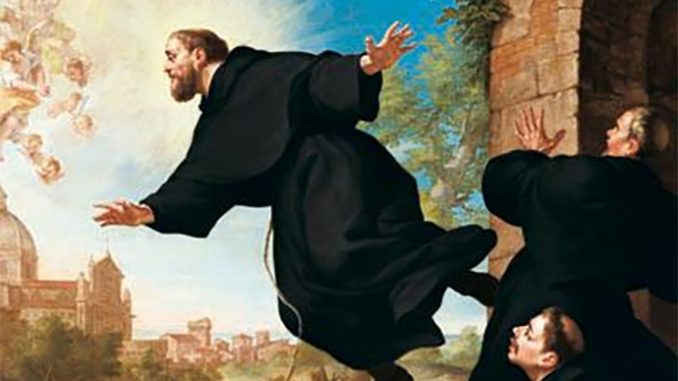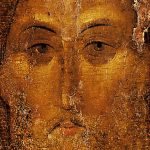
His classmates called him “the Gaper,” an ugly nickname to describe his habit of staring with his mouth wide open. But today he is known as Saint Joseph of Cupertino, or, as the Italians say, San Giuseppe da Copertino (1603-1663).
Joseph is also remembered for exhibiting extraordinary phenomena that, to modern ears, sound like pure fiction. Are we supposed to believe that a man could sometimes rise in the air, without any visible support, up to the tops of the trees? Surely, we are tempted to say, reports of Joseph’s levitation are just stories told by gullible, superstitious peasants who had been conned by a magic trick or who were exaggerating an event that had a perfectly rational explanation. The real story is much more interesting than that.
Joseph’s father, Felix, was originally a carpenter in the village of Copertino, Italy. Unfortunately, Felix became so deeply in debt that he ran away from Copertino to escape his creditors. His mother, Frances, gave birth to Joseph in a stable, the only place she could find to live at the time. Felix apparently never (or very rarely) returned to his family, and Joseph was raised solely by his mother, who used stern measures to discipline her unruly son.
Some versions of Joseph’s biography say that Frances really did care for her son but was at her wits’ end knowing how to deal with him as a poor, single mother. Other reports say that she considered him a great nuisance. Joseph himself later told others that the strictness of a Franciscan novitiate was nothing compared to the strictness of life with his mother.
As a boy, Joseph was a poor student, except in the subject of religion. Considering his unhappy family life, it’s not surprising that he had a bad temper. He was also absent-minded and was easily distracted. People noticed that he sometimes wandered about aimlessly and even forgot to eat. If Joseph were alive today, he would almost certainly be given some sort of “special needs” designation. But at the time, he was mostly ridiculed by his peers and endlessly made aware of his failings by his mother.
Teenaged Joseph was sent to serve as an apprentice to a shoemaker, but he couldn’t master the trade. Then he tried to enter religious life, but he was refused point-blank by the first Conventual Franciscan community he approached. A second friary, this time Capuchin Franciscans, initially accepted him as a religious brother. But after Joseph had destroyed too many dishes through his clumsiness and had repeatedly failed to remember to do his assigned tasks, they sent him away.
However, Frances had no intention of supporting her good-for-nothing son forever. She ordered Joseph to travel to Grotella and ask for help from her brother, a Conventual Franciscan priest. After Joseph’s uncle had chewed him out for his repeated failures in life, he helped Joseph get a job as a servant in the community.
That’s when Joseph’s behavior began to change. He was still assigned the lowest chores, such as cleaning the stables, but at least he managed to complete them. The Franciscans gradually noticed a significant improvement in his temper and his humility, and they accepted him as a novice. They were astounded by the mortifications he took upon himself. For example, he was able to fulfill his assigned duties, mostly manual labor, even though he only ate any food on two days a week during Lent. They were also disappointed that such a pious man could be such a terrible student in the classroom.
Joseph was admitted to the Franciscan order, and his teachers later decided he was worthy of ordination to the priesthood. However, they seriously doubted that he would ever be able to pass the required theological examination. Still, they gave him a chance to try.
According to one account, when the priest arrived and administered the final exam to Joseph, the priest opened the Bible at random, pointed to a verse, and asked Joseph to explain it. That verse happened to be the one verse in the entire Bible that Joseph loved best. According to another version describing his final exam, Joseph and other candidates for the priesthood were gathered together so that each one could be asked questions by a priest. But the priest was in a hurry that day, and when the first candidate answered well, he simply approved all the other candidates in the room at the same time. Either way, it was a miracle.
And that was just the beginning of the inexplicable events that surrounded Joseph. According to Butler’s Lives of the Saints,
From the time of his ordination St. Joseph’s life was one long succession of ecstasies, miracles of healing and supernatural happenings on a scale not paralleled in the reasonably authenticated life of any other saint.
Throughout the rest of his life, Joseph often displayed the gift of prophecy, accurately predicting the deaths of popes and other future events. He had visions of our Lord, saints, and angels, and he was attacked by demons. He prayed over sick people, and they recovered. He could tell that someone had sinned—and which sins they committed—by merely looking at them, and he would tell such people, “Go wash your face which you have sullied with ink,” (which they knew meant they needed to go to Confession). He singlehandedly moved a thirty-six-foot-long cross into its place as part of a Calvary display after ten men had been unable to move it. He bilocated to be present at the death of a devout man named Octavius and also at the death of his own mother. At both deathbeds, many witnesses testified that they saw Joseph in the dying person’s room, even though he was living many miles away.
But his greatest gift was clearly his ability to levitate, as is humorously portrayed in the 1962 movie, The Reluctant Saint. Joseph physically rose above the ground, sometimes a few feet and sometimes the height of the church. Sometimes he seemed to fly through the air or even dance as he moved toward the sanctuary, a statue, or the tabernacle. These levitations could last for minutes or hours, during which time Joseph seemed completely cut off from the world. However, if Joseph’s superior ordered him, under obedience, to stop, the levitation would cease immediately.
Seventy occasions of levitation were recorded during Joseph’s time at Grotella. Afterwards, his levitations became such a routine occurrence that no one bothered to write them down, for a lifetime total of hundreds, perhaps thousands, of levitations.
These miracles were not written down centuries after the fact or reported only by uneducated laymen. The events of Joseph’s life were recorded during his lifetime and attested to by dozens of witnesses, including members of his Franciscan community and previously skeptical clergymen. When Joseph was ordered to appear before Pope Urban VIII, Joseph went into an ecstasy and levitated in his presence. The pope declared that if Joseph died before him, he would testify on behalf of the miracle he had just seen.
Obviously, news about a Franciscan friar with such astonishing gifts traveled far and wide. For many years, hundreds of people witnessed these events in the Franciscan church in Grotella. Investigations of Joseph verified his faithfulness, obedience, and humility. But the crowds who sought him out and the public spectacle of his levitations during Mass became a serious problem.
In the end, the Franciscans found a solution. They moved Joseph to a remote monastery, refused to divulge his location, and moved him again each time the laity found him. His superiors forbade Joseph from celebrating Mass in public, kept him apart from his brother friars, and generally isolated the kind, gentle man from the rest of the world. But Joseph did not mind. He died at the age of sixty with a smile on his face, anxious to enter Heaven.
Considering the number of contemporary witnesses to these events, the miracles surrounding Joseph’s life simply cannot be written off as the result of fraud, gullibility, or superstition.
It appears that Joseph began to receive these mystical gifts just as his life was hitting rock bottom, when he had nowhere else to go, and when he needed supernatural help to conquer his personal weaknesses. That’s when he must have cried out to God for assistance.
When a man or woman says to God, “I give you everything,” and then really does hand over control of his or her entire life, God will accept that offer. However, God, who created each of us with our own unique qualities and who placed us in our own unique circumstances in life, has His own idea of what kind of saint each person should become.
Or as Saint Thomas Aquinas once explained it, “Grace does not destroy nature, but perfects it.” Just as God perfected the brilliant Thomas of Aquino to become one kind of saint, so He perfected the awkward Joseph of Cupertino to become another kind of saint.
For example, Thomas was a well-born, well-educated man with a brilliant mind, and he became a holy theologian and philosopher.
What should God do with a man who did not have a brilliant mind, an excellent education, or a family devoted to promoting his professional success? What if, instead, that man was more suited to working with his hands than his head, had known a lifetime of rejection from men but still loved God, and was easily distracted by things around him?
According to Carlos Eire’s They Flew,
A Jesuit who was granted permission to speak to [Joseph] said afterward: “He is very intensely united to God and his heart is more disposed to this union than gunpowder is to ignition by the tiniest spark.”
Joseph’s brother friars noticed that Joseph loved God so much that even talking about Him would often move Joseph into an ecstasy and cause him to levitate. (His brothers learned to be very careful about not talking about God to him when they didn’t want him to levitate.) Joseph’s levitations generally occurred in a clear direction: toward the church’s tabernacle, a statue of the Mother of God, or a crucifix. Joseph literally moved toward his Beloved, even when that required him to defy the law of gravity.
During those miraculous moments, Joseph may have appeared silent to his observers, but internally, he was clearly pouring out his heart with love for God. The levitations may have embarrassed Joseph—just as they embarrass rational Catholics today—but these miraculous phenomena were a powerful lesson to those who witnessed them. The sight of Joseph levitating in the air reminded them that God desires us to have a childlike, humble love for Him and that such a love does not require us to have advanced degrees in theology.
And that name Joseph was given as a child? His tormentors never knew how accurate that unkind nickname would become. If every Catholic was as humble and simple as we are called to be, we would spend more of our lives gaping into Heaven, just like Saint Joseph of Cupertino.
Endnotes:
If you value the news and views Catholic World Report provides, please consider donating to support our efforts. Your contribution will help us continue to make CWR available to all readers worldwide for free, without a subscription. Thank you for your generosity!
Click here for more information on donating to CWR. Click here to sign up for our newsletter.












